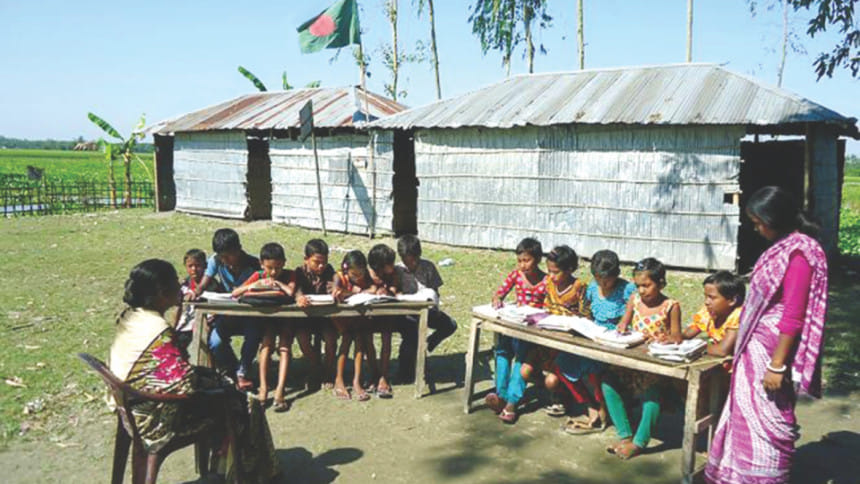Broken classrooms drive students outdoors

From students of 38 primary schools in Nilphamari's Jaldhaka upazila there can be few complaints of stuffy classrooms with poor ventilation. The classrooms at these schools are largely unfit for use, with many lessons taking place under the open sky.
"A survey on the physical condition of primary schools was conducted a few months ago," says upazila engineer Md Harun Ur Rashid. "And 35 schools were found to have infrastructure in too vulnerable a state to facilitate the smooth running of the school." The number of schools of concern subsequently climbed to 38, with an additional three added to the list by the upazila primary education officer.
These schools were nationalised three years ago in the second phase of the government's primary school nationalisation programme, apart from the additional three which were nationalised two decades ago.
"At our school some of the tin-sheet classroom walls have disappeared," says teacher Sudipta Rani of Gabrol Deeperpar Dolapara Government Primary School, which is included on the list. "Cows and goats grazing in nearby fields sometimes enter the classrooms making them dirty."
"On account of the cow dung and animal urine, the classrooms are like hell, and most children are reluctant to attend school," she continues, "With no alternative we arrange lessons outside." The school has 190 students enrolled.
At Bhabon Chur Government Primary School the situation is little better, with leaking tin roofs allowing rainwater in during the monsoon months and intense sunshine during the summer. "Due to the poor classroom conditions," says headmistress Monwara Begum, "the students are seldom interested to listen to their teachers attentively. Sometimes we arrange classes outdoors instead."
At Ideal Para Government Primary School where 185 students are enrolled, the headmaster is kept busy transporting all important papers to and from his home since the broken-walled classrooms also lack doors. Students there have no tube well for clean water and as there is no sanitary latrine, they go to a nearby clump of bamboo when nature calls.
"A good number of our students have left the school due to the prevailing conditions, says Masud Alam Beg, headmaster of Laxmimarai Government Primary School. "Some of them enrolled at other schools while others dropped out altogether."
Jaldhaka's upazila primary education officer Md Shahjahan says urgent requests have been made to his higher authorities to take measures to construct new academic buildings soon. "We've received a positive response," he says.
"The government will construct new buildings at the vulnerable schools in phases," agrees the upazila nirbahi officer of Jhaldhaka, Rashedul Huq Prodhan. "Until then we hope the authorities of each school will make sincerest efforts to cope as best they can."

 For all latest news, follow The Daily Star's Google News channel.
For all latest news, follow The Daily Star's Google News channel. 



Comments